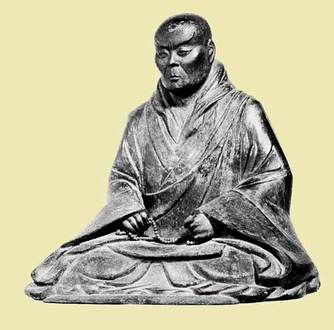Ch'an Dao Links:
|
Is It True That Japanese Buddhist Monks Can Get Married?
Translator’s Note: This is an English translation of a short
Chinese text entitled ‘听说日本僧人都有家室,是吗?,
or ‘Is It True That Japanese Buddhist Monks Can Get Married?’. It conveys how Japanese Buddhist monks
transitioned from the practice of celibacy to that of marriage. In the early 1950’s, Master Xu Yun was asked
by the Chinese government to participate in the inauguration of the Chinese
Buddhism Association. At one of these
meetings in Beijing, a group of Chinese Buddhist monks petitioned the
government to pass a law that allowed Chinese Buddhist monastics to get married
– copying the example common to Buddhist monks in Japan. However, Xu Yun slapped his hand on the table
told everyone that the Buddha-Dharma begins and ends with the following of ALL
the precepts. Zhou Enlai looked at Mao
Zedong – who nodded in agreement with Master Xu Yun – and the petition was
denied. This is why Chinese Buddhist
monks do not marry today.
ACW 26.11.14 Originally, Japanese monks were not allowed to get married. During the 12th century, the (Pureland based)Jodo Shinshu (净土真宗 – Jing Tu Zhen Zong) Sect of Japanese Buddhism was founded by the monk called Shinran (亲鸾 – Qin Luan), who advocated spiritual practice with a wife. He settled down with his wife, started a family and had children. For hundreds of years, the institution of married monks was limited to just the Jodo Sect, but following the Meiji Restoration (明冶维新 – Ming Ye Wei Xin) of 1868, the practice of Buddhist monks getting married started to spread to other Buddhist sects in Japan. Now, only a few Buddhist monks in the Jodo Sect practice celibacy, whilst the vast majority follow Shinran’s example and get married. This is a common practice throughout contemporary Japanese Buddhism, where many monks get married, and pass on their Buddhist lineage to their children and grandchildren. This is a hereditary system, where for example, the control of a temple passes from father to son. This system has caused Buddhism to spread throughout lay society, taking root within family homes, and encouraging lay-practice. However, although many Japanese monks do get married, it is also true that many other monks (and nuns) in Japan follow the precepts strictly and do not get married out of choice – even though they could do. ©opyright: Adrian Chan-Wyles (ShiDaDao) 2014. Original Chinese Language Article: http://doorway.fjnet.com/fojiao/06fjcs/fjcs/314.htm 听说日本僧人都有家室,是吗? 原来日本僧人都是没有家室的。公元十二世纪时期,净土宗的一派--净土真宗的创始者亲鸾倡导带妻修行,开始娶妻生子。其后几百年中这个制度只限于这一宗派。到明冶维新后,僧人结婚的风气便在其它各宗派中流行起来。现在除少数宗派的少日本净土真宗的创始人亲鸾数僧人仍然过独身生活外,绝大多数僧人都有家室,他们的子孙世袭僧人的职业。这便形成了以在家佛教徒担任弘传佛教事业的制度。但是这种情况只是属于男僧人,今天日本的尼众还是出家如律持戒的。 |
